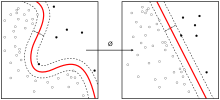오토인코더
보이기
| 기계 학습과 데이터 마이닝 |
|---|
 |
오토인코더(Autoencoder)는 인코더를 통해 입력을 신호로 변환한 다음 다시 디코더를 통해 레이블 따위를 만들어내는 비지도 학습 기법이다.[1]
종류
[편집]응용
[편집]오토인코더의 두 가지 주된 응용은 차원 축소와 정보 검색이지만,[2] 현대적인 변형법이 다른 곳에도 응용되어 왔다.
역사
[편집]오토인코더는 'autoassociator',[3] 'Diabolo network'로도 불렸다.[4] 처음으로 오토인코더가 응용된 것은 1980년대로 거슬러 올라간다.[2][5][6][7] 가장 전통적인 응용은 차원 축소나 특징 학습이지만, 그 외에도 오토인코더는 데이터의 학습 생성모델에 널리 사용되게 되었다.[8][9] 2010년대 개발된 가장 강력한 인공지능 일부는 심층 인공신경망 안에 오토인코더가 포함되어 있다.[10]
같이 보기
[편집]- 특징 학습(Feature learning)
- 차원 축소 (통계학)
각주
[편집]- ↑ Kramer, Mark A. (1991). “Nonlinear principal component analysis using autoassociative neural networks” (PDF). 《AIChE Journal》 37 (2): 233–243. doi:10.1002/aic.690370209.
- ↑ 가 나 Goodfellow, Ian; Bengio, Yoshua; Courville, Aaron (2016). 《Deep Learning》. MIT Press. ISBN 978-0262035613.
- ↑ Japkowicz, Nathalie; Hanson, Stephen José; Gluck, Mark A. (2000년 3월 1일). “Nonlinear Autoassociation Is Not Equivalent to PCA”. 《Neural Computation》 12 (3): 531–545. doi:10.1162/089976600300015691. ISSN 0899-7667. PMID 10769321. S2CID 18490972.
- ↑ Schwenk, Holger; Bengio, Yoshua (1997). “Training Methods for Adaptive Boosting of Neural Networks”. 《Advances in Neural Information Processing Systems》 (MIT Press) 10.
- ↑ Ackley, D. H., Hinton, G. E., & Sejnowski, T. J. (1985). A learning algorithm for Boltzmann machines. Cognitive Science, 9, 147-169.
- ↑ Schmidhuber, Jürgen (January 2015). “Deep learning in neural networks: An overview”. 《Neural Networks》 61: 85–117. arXiv:1404.7828. doi:10.1016/j.neunet.2014.09.003. PMID 25462637. S2CID 11715509.
- ↑ Hinton, G. E., & Zemel, R. S. (1994). Autoencoders, minimum description length and Helmholtz free energy. In Advances in neural information processing systems 6 (pp. 3-10).
- ↑ Diederik P Kingma; Welling, Max (2013). “Auto-Encoding Variational Bayes”. arXiv:1312.6114 [stat.ML].
- ↑ Generating Faces with Torch, Boesen A., Larsen L. and Sonderby S.K., 2015 torch
.ch /blog /2015 /11 /13 /gan .html - ↑ Domingos, Pedro (2015). 〈4〉. 《The Master Algorithm: How the Quest for the Ultimate Learning Machine Will Remake Our World》. Basic Books. "Deeper into the Brain" subsection. ISBN 978-046506192-1.
| 이 글은 컴퓨터 과학에 관한 토막글입니다. 여러분의 지식으로 알차게 문서를 완성해 갑시다. |
